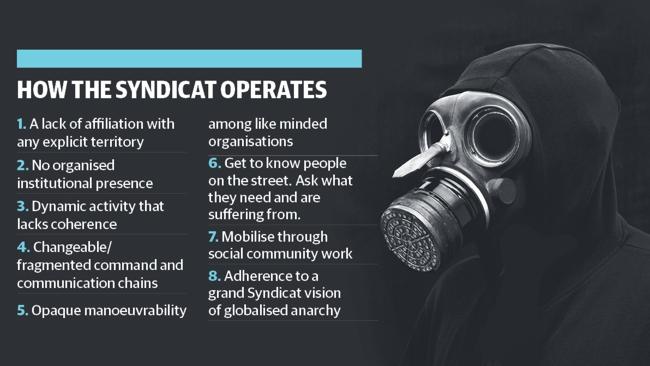The virtual ghost of anarchism is haunting the tabloids again, this time in the form of the Black Rose Syndicat, an Internet phantasm promising to ruin the G20 summit in Brisbane in November next year. No anarchist I know of, in Sydney or elsewhere, has had any association with the Syndicat in real life. So who are they — and why are they newsworthy?
The Syndicat is of very recent origin. Their name is presumably a corruption of the French term ‘syndicate’, meaning 'union'. In similarly garbled language they announced their existence in a May post on Sydney Indymedia. Their program? “[A]dherence to a grand Syndicat vision, Globalised Anarchy”, among other things.
The Facebook page linked to in the Indymedia article has since been retitled Save the PUNK Foundation: Anonymous Group; it, in turn, links to an eBay account titled The Black Rose Rock Shop, maintained by “vanadiumrockshop”, which sells a range of items from political literature to women’s clothing, men’s jeans, tablet/iPad covers and even Lady Gaga CDs.
For local anarchists "Black Rose" is more commonly associated with the infoshop established in Sydney in 1984, currently operating out of premises in Newtown. Despite the Syndicat having adopted the term and also claiming to be located in Newtown, there are no links between the two that I know of.
While the Syndicat’s fragmented and frequently bizarre public announcements seem intended to position it as a group dedicated to militant confrontation with its enemies, it has given shout-outs to the Sydney-based fascist "New Right" groupuscule sometimes known as the "national anarchists" — a group Sydney anarchists have clashed with in the past — and the WikiLeaks Party.

The Courier-Mail's confused report on the Syndicat serves to warn those who actually intend to oppose the G20 summit that the authorities are ready. It also informs the general public that, while legislative and police measures may seem unduly harsh, they’re required in order to prevent the "chaos and mayhem" the anarchists, along with their black hoodies, promise to bring to Brisbane.
In the wake of the Mail’s Syndicat report, Clive Williams, “a specialist in politically motivated violence from Macquarie University”, was invited on to 4BC to inform listeners what he knew of the group.
According to Williams, the group is “probably loosely” based at the University of Sydney, but is certainly encouraging others to attend the summit to commit violence and is likely connected, in some fashion, to the anarchist group known as the Black Bloc.
Williams' analysis has many flaws — in regards to the Syndicat, summit protest history and anarchist philosophy and practice — but broadly supports the state’s criminalisation of a range of actions previously understood as constituting legitimate protest activity.
Since the late 1990s and early 2000s, on a global scale, state authorities have developed a fairly standard repertoire of tactics intended to repress anti-summit protests. Apart from routine surveillance and infiltration, included among these measures are the fortification of summit sites, the establishment of security zones, the introduction of repressive legislation, comprehensive media strategies and the targeting of key individuals, groups and coalitions with the aim of disrupting protest organisation, legal monitoring and medical aid.
Overall, and especially when placed in the context of the global post-9/11 War on Terror, the strategy has been remarkably, although not entirely, successful. While the G20 summit in Melbourne in 2006 was the site of some spirited protest (and many years of trials for those unfortunate enough to be deemed ‘rioters’), the major concern raised in much of the commentary regarding 2014’s gathering has been to avoid a repeat of the more militant and widespread opposition to the G20 summit in Toronto in June 2010, at which the police engaged in the largest mass arrest (over 900 people) in Canadian history.
The Syndicat identified by the Courier-Mail in 2013 conforms to the type produced by the Daily Telegraph to titillate at the time of the WTO summit and protests in Sydney in November, 2002. On that occasion readers were treated to the spectacle of a man named “Jonny Hammerlock”. From the front pages a balaclava-clad Jonny proudly declared that he would be in the front lines of the protest, using something he called a "molotov bong" — yes, a cross between a bong and a Molotov cocktail — to disrupt the summit.
Rather like the Syndicat, Jonny Hammerlock came from nowhere, performed for the cameras, and then disappeared. Nobody I knew had ever seen Jonny before and sadly I’ve heard nothing from the comrade since.
As it stands, while the Syndicat is unlikely to rock the summit’s foundations, it remains possible that anarchists will form a small part of a much larger mobilisation. Having already introduced draconian laws drastically curbing civil liberties, the coming year will see the Queensland government seeking to implement a series of unpopular policies aimed at depressing wages and conditions. The G20 may yet become a focus of these and other, broader concerns — and who knows, maybe Jonny Hammerlock and his Molotov bong will stage a return.
Donate To New Matilda
New Matilda is a small, independent media outlet. We survive through reader contributions, and never losing a lawsuit. If you got something from this article, giving something back helps us to continue speaking truth to power. Every little bit counts.



